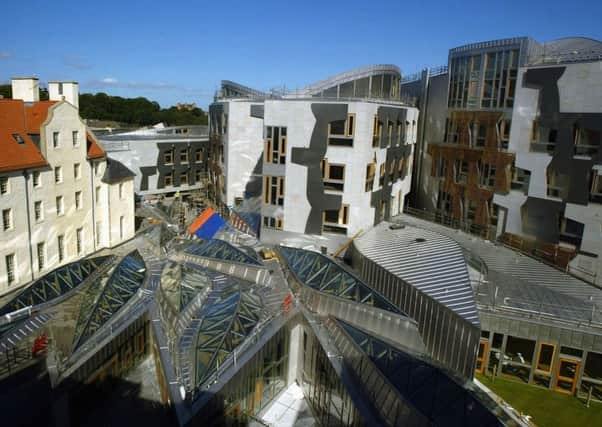Warning Scot firms will go under as critics hit out at rates


The Scottish Parliament report found certain regional hotspots, such as the east of Scotland and the Borders, faced particularly high rates.
A flagship Scottish Government review of the business rates system is to report this week, after a rebellion by companies across the country earlier this year over the prospect of hikes of up to 400 per cent in their bills.
Advertisement
Hide AdAdvertisement
Hide AdThe latest report by the Scottish Parliament Information centre (Spice) appears to back up complaints from organisations such as the Federation of Small Businesses in Scotland that smaller shops, hotels and pubs face a proportionately heavier burden
“There is a significant variation of rates as a share of operating surplus [profits] across different sectors,” the report finds.
“ Non-domestic rates (NDR) as a share of operating surplus is significantly higher in the accommodation and food services sector than any other sector of the economy, particularly construction and manufacturing.”
Shops which are covered by, the “wholesale, retail and repairs” category pay about 30.8 per cent of rates. This is about three times as high as manufacturing (11.1 per cent) despite both making a similar contribution to the economy.
Although manufacturing accounts for almost a sixth of total gross value added (GVA) – the measure of the value of goods and services produced – it pays just over a tenth of rates.
David Lonsdale, director of the Scottish Retail Consortium, last night stepped up demands for change.
He said: “This report reinforces the pressing need for a reformed rates system which flexes with trading conditions, better reflects our changing economy, and which encourages commercial investment rather than deters it.” Accommodation and food services, which covers the pub industry, has the highest ratio of rates in relation to profits – about 10 per cent – in most areas of Scotland. In east Scotland, the figure for this sector reached as high as 17 per cent.
The construction industry has the smallest share of rates. It pays about 2 per cent, both overall and in relation to profits, the report finds.
Advertisement
Hide AdAdvertisement
Hide AdThe research, conducted by Anouk Berthier, was based on data from the Scottish Annual Business Survey (SABS) from 2011 to 2014 in relation to operating surplus, a form of profits.
It comes after widespread anger across the pub trade earlier this year when a review of the “rateable value” of firms, the first in seven years, resulted in a rise of about 8.75 per cent. This sent annual bills soaring by up to 400 per cent in some cases.
Among the more high profile critics was influential North-east hotelier Stewart Spence, the owner of the five-star Macliffe near Aberdeen, who warned he would refuse to pay a proposed 25 per cent increase before the Scottish Government climbed down. He said it ignored a 40 per cent drop in turnover following the oil slump.
Another prominent critic was Donald MacLeod, managing director of HoldFast Entertainment, which owns the Garage and Cathouse venues in Glasgow.
Finance Secretary Derek Mackay eventually stepped in and announced a cap of 12.5 per cent in increases for firms, which turned out to be closer to 14.5 per cent after inflation.
Scottish Licensed Trade Association (SLTA) chief executive, Paul Waterson said last night the latest research shows the need for change.
“Supermarkets, on the whole, their rateable values went down in this last review to consider these multi-billion operations where their rates are actually going down is completely unfair,” he said.
He warned that many firms only survived because of the cap imposed by ministers, but unless the changes set out in the Barclay review are fair then Scotland will lose “thousands of pubs”.
Advertisement
Hide AdAdvertisement
Hide AdThe Barclay rates review was ordered before the row over the revaluation earlier this year, but it has taken on wider political significance in view of the fall-out.
Business rates are collected by Scottish councils, but rateable values are set by the independent Scottish Assessors Association.
They are charged on the rateable value of the premises – there is no connection to a premise’s economic performance such as turnover or profitability. As well as businesses, they are also paid by public and third sector bodies.
Former RBS banker Ken Barclay, who chaired the Barclay review, told MSPs earlier this year that he was considering whether to recommend a shift away from the current property-based tax for rates in favour of “another form of tax”.
The Federation Of Small Businesses has complained that many firms feel the current system is unfair.
“A tax based on property, without a link to sales or profit, is always likely to be a larger overhead for smaller firms and start-ups, relative to larger firms,” it warned in a submission to MSPs earlier this year.
Even Mr Mackay’s efforts to defuse the situation by introducing a cap was met with an outcry when it emerged that it would not be automatic and that business will have to apply for the relief, sparking further claims by industry leaders of trade confusion and poor communication.
It prompted the Scottish Tourism Alliance (STA), the British Hospitality Association (BHA) and the SLTA to raise concerns with the Scottish Government over the confusion after widespread complaints from their members.
Advertisement
Hide AdAdvertisement
Hide AdMinisters have said they anticipate that businesses will be able to apply for relief and have this applied to their bills before they have to pay “any portion” of their business rates.
Drinks giant Tennent’s has today called on its customers across Scotland to challenge the new Rateable Value of their business premises ahead of the September 30 deadline.